Election year: Will US and Europe maintain unity on Ukraine amid turbulent 2024
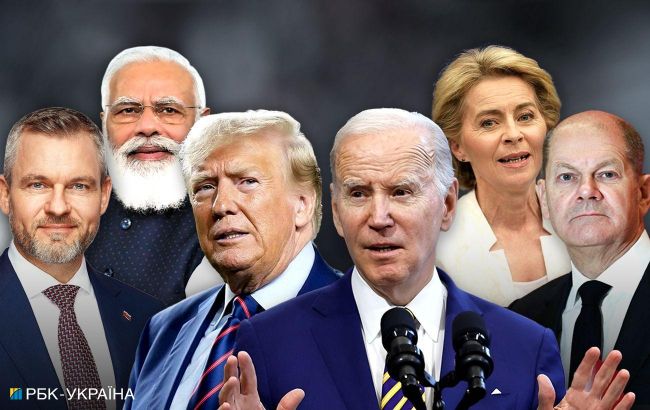 The year of major elections may call into question the unity of Ukraine's partners (RBC-Ukraine collage)
The year of major elections may call into question the unity of Ukraine's partners (RBC-Ukraine collage)
The current year 2024 is called by many the year of big elections because, for the first time in history, it will be held in more than 70 countries with a total population of 4 billion people. And the results of at least some of them, especially in the West, may affect support for Ukraine. More about the key elections of 2024 in the RBC-Ukraine article.
Sources used: Wikipedia, material by Focus Taiwan, Meduza, The Guardian, BBC, The New York Times, Politico, and comments by Ukrainian experts and analysts.
Contents
- Taiwan. Possibility of new war due to Democrat victory
- Russia. Putin was "elected" for fifth term to continue fighting with Ukraine
- Slovakia. Whether Fico's ally intensify anti-Ukrainian rhetoric
- India. Why world's largest democracy remains neutral
- European Parliament. How June elections may affect support for Ukraine
- Germany. Right strengthening can shake already vulnerable Scholz
- USA. Main elections of 2024 and challenges for Ukraine
- United Kingdom. Conservatives are losing their ratings, but support for Ukraine will not weaken
Electoral cycles are a great stress, not only for our partners but also for Ukraine. Prime Minister Denys Shmyhal said this at the beginning of March in the context of supporting our country in the war with the Russian Federation.
"We understand that the help of partners is an extremely important tool, but we need predictability and stability regardless of time, political preferences, and electoral cycles of the world. This year is the year of 74 elections, especially among our partner countries," he said.
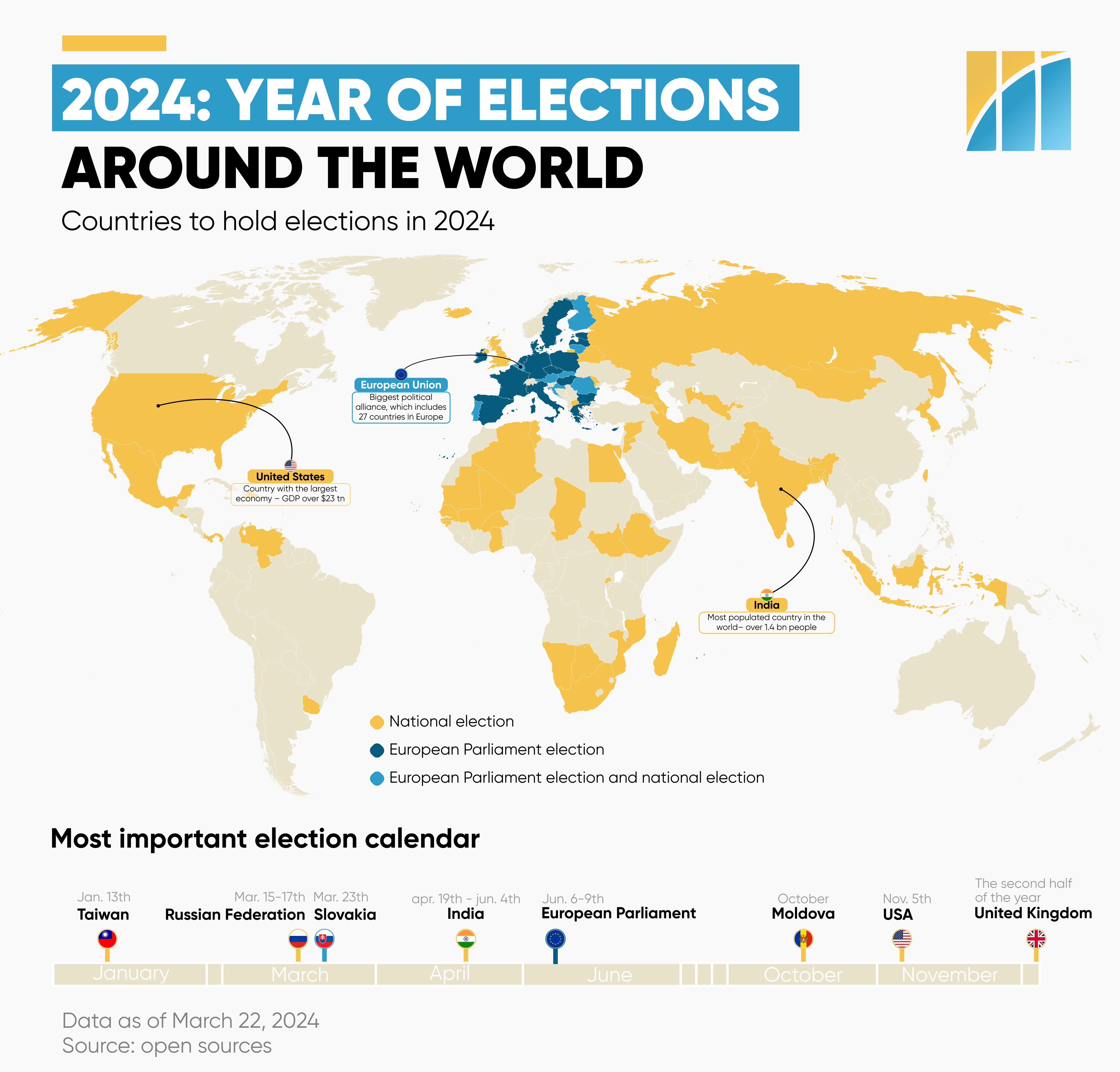 Election year in almost half of the world's countries (RBC-Ukraine infographic)
Election year in almost half of the world's countries (RBC-Ukraine infographic)
This year, a new government will be elected in the USA, several European, and Asian countries, and more. Below we will consider the main elections of 2024 and why the future of Ukraine depends on them.
Taiwan. Possibility of new war due to Democrat victory
The first election in 2024, which was watched with interest in the world, took place in Taiwan. Here, the President and the new parliament were elected at the same time. The results were called fateful because of geopolitics and the threat of a regional conflict between China, which does not seem to be giving up on annexing the island by force, and the United States, which is Taiwan's main ally.
Lai Tsinghe of the ruling Democratic Progressive Party (DPP), Hou Yu-ih of the Kuomintang, and Ko Wen-je (Taiwan People's Party, in opposition to the other two) contested for the presidency. Lai won, whose administration will begin work in May. According to the results of the elections to the parliament, the Democrats, who are in favor of rapprochement with Washington, lost their majority and are trying to win the votes of the popular party. The Kuomintang, which in the late 1940s created the Republic of China in Taiwan, is, not surprisingly, currently seeking rapprochement with the mainland.
 Democrat Lai Tsinghe will become the new president of Taiwan and will continue a cautious policy to avoid confrontation with China (photo by Getty Images)
Democrat Lai Tsinghe will become the new president of Taiwan and will continue a cautious policy to avoid confrontation with China (photo by Getty Images)
Taiwan is de facto an independent state, but it is unlikely that Lai will take any steps towards declaring independence. First, most Taiwanese are happy with the status quo. Secondly, such a maneuver is unlikely to be approved by the USA due to the high probability of a military confrontation with China.
The emergence of another hot spot is not in favor of Ukraine, because in this case, it is not a fact that America will retain priority in supporting our country. Regarding the Russian-Ukrainian war, the government of Taiwan condemned Russia's full-scale invasion of Ukraine and joined the international sanctions. In March 2022, President Tsai Ing-wen and then-Vice President Lai Ching-te donated a month's salary to humanitarian aid. Since then, the island has provided 27 tons of medical supplies and more than 700 tons of humanitarian aid worth more than $40 million. And in 2023, a special humanitarian budget for almost 60 million dollars was formed.
Lai's victory leaves Taiwan in the conditional pro-Ukrainian camp. This is confirmed by the reaction to the investigation that Russia receives some equipment through third countries, as well as components of Taiwanese production for tanks. Last month, fines for violating export controls were increased, and the list of prohibited goods for deliveries to Russia and Belarus was expanded.
Russia. Putin was "elected" for fifth term to continue fighting with Ukraine
The day before, the Russian Central Election Commission summed up the results of the so-called "presidential elections". Vladimir Putin allegedly received a record 87.28% of the vote for a record turnout of 77.49% and easily secured a fifth term. So-called opposition media call the vote the most dishonest in the history of Russia. It is difficult to establish the scale of falsifications due to the mass throwing of ballots and manipulation of protocols. Many numbers may be just made up, Meduza writes.
Oleksandr Musienko, head of the Center for Military and Legal Research, said in a commentary for RBC-Ukraine that Putin needs "record" support to show how supposedly all Russians support his course and the war against Ukraine.
Read more in the RBC-Ukraine article "Putin wins election again: Russia's future path and Ukraine's challenges ahead".
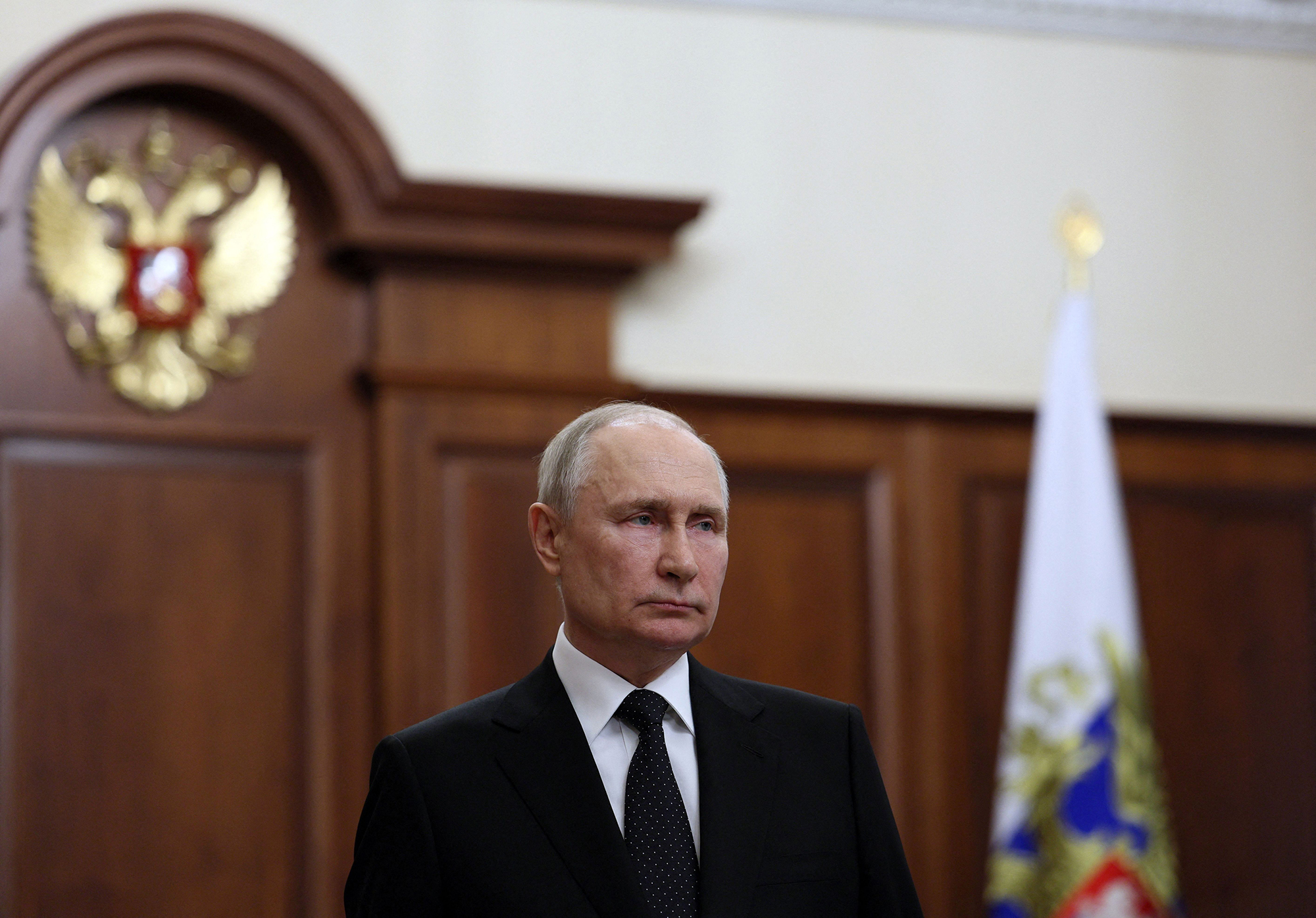 Vladimir Putin "won" with a record score to continue fighting against Ukraine (photo by Getty Images)
Vladimir Putin "won" with a record score to continue fighting against Ukraine (photo by Getty Images)
War has been the basis of Putin's entire campaign and will remain an organizing principle until 2030, notes The New York Times. Even last week, he said that the Russians are forced to create the future with weapons in their hands. Thus, the dictator will not give up the war, which is the main threat to our country. Another offensive is expected in May-June, and many Ukrainian and foreign experts believe that this requires large-scale mobilization. According to Oleksandr Kovalenko, a military-political expert of the Information Resistance group, the Russian occupiers can recruit up to 0.5 million people.
In addition, new threats rang out from the dictator's mouth. According to him, in response to the raid by volunteers from the Russian Volunteer Corps and other formations, Russia may go to the creation of a sanitary zone. They meant the attack and capture of Kharkiv and the region. But for this purpose, he will not have enough strength and means even after mobilization, Kovalenko adds.
Slovakia. Whether Fico's ally intensify anti-Ukrainian rhetoric
Tomorrow, March 23, presidential elections will start in neighboring Slovakia. And they promise to become no less interesting during the 2023 parliamentary campaign, which ended with the victory of Eurosceptics and the coming to power of Robert Fizo, the leader of the SMER party, known for his anti-Ukrainian sentiments. He has already stopped free military aid and is threatening to block Ukraine's accession to NATO.
The current president, Zuzanna Chaputova, with whom Kyiv has developed warm relations, is not participating in the race. The main contenders are Parliament Speaker Peter Pellegrini and ex-Minister of Foreign Affairs Ivan Korchok ("Freedom and Solidarity", SaS). Their ratings are in the region of 33-36%, and right-wing politician Stefan Garabin is in third place with 15%.
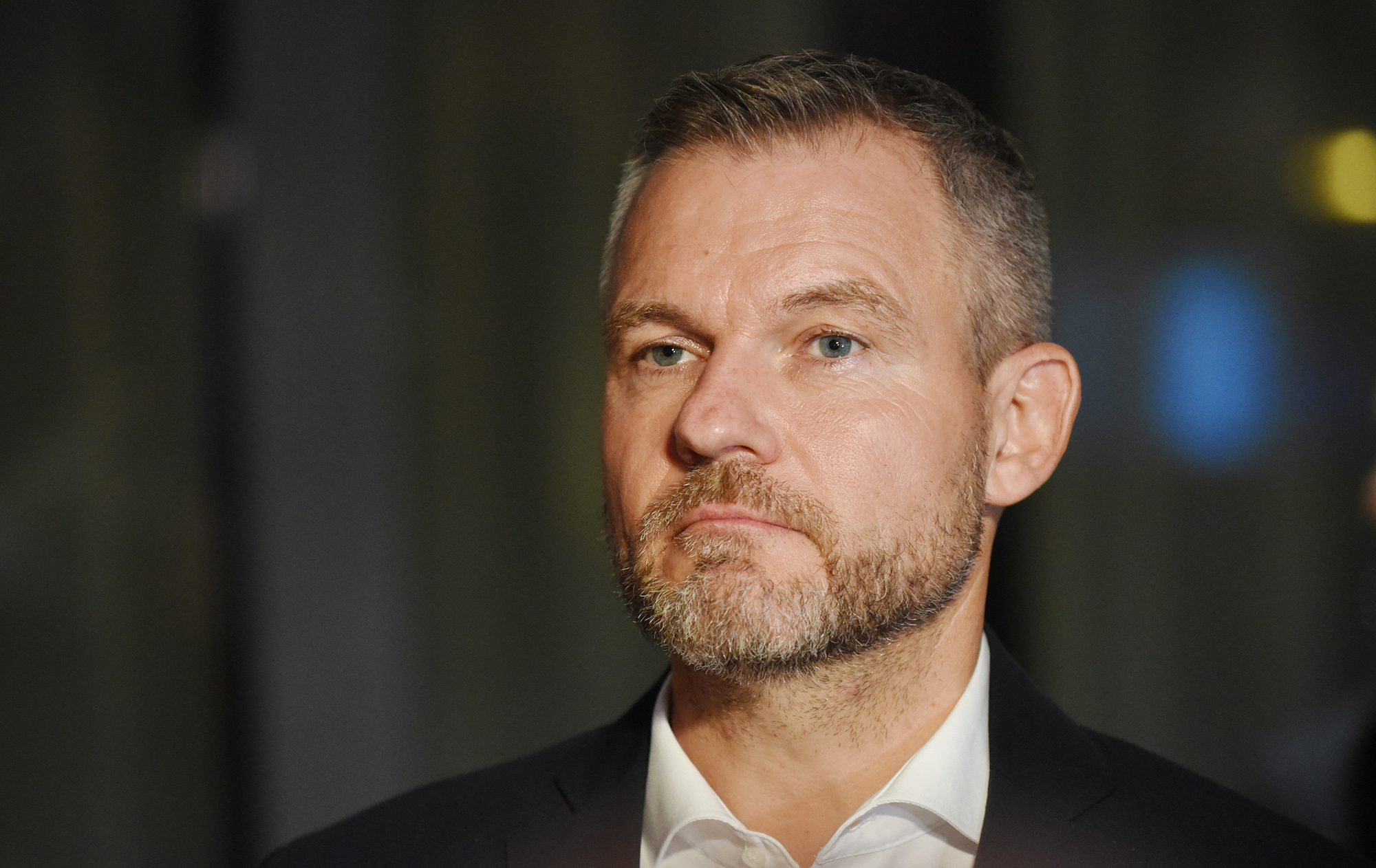 Peter Pellegrini may become the new president of Slovakia, but in the second round he will face pro-EU politician Ivan Korchok (photo by Getty Images)
Peter Pellegrini may become the new president of Slovakia, but in the second round he will face pro-EU politician Ivan Korchok (photo by Getty Images)
Pellegrini heads the Hlas party, which is in a coalition with Fico's political force. Korchok is called a pro-Western and pro-Ukrainian politician. According to former Prime Minister Eduard Heger, the election will decide whether Slovakia will remain in the Western club, as the current government has turned it towards the Kremlin.
In the autumn of 2023, Pellegrini was considered a deterrent for Fizo, but the reality turned out to be different, said Milan Nich, a senior researcher at the German Council on International Relations, in a comment for The Guardian. According to him, the leader of Hlas puts victory in the presidential race above all else and counts on the votes of SMER supporters.
After the change of government, Bratislava did not block any important decision of the EU regarding Ukraine. And in general, there is still no clear answer as to whether Pellegrini's victory will strengthen the pro-Russian course, explains political scientist Volodymyr Fesenko.
"He has a more moderate position than Fico. From what I heard, Pellegrini is not such a pro-Russian or anti-Ukrainian figure. They are partners, but at one time there was competition and Pellegrini left Fico's party, now there are also differences. Of course, there is also the risk that together they will take power and foreign policy under complete control, however, the powers of the President are limited and the government is still a coalition, this is not the situation as, for example, in Hungary, where there is only one dominant figure, Viktor Orbán. Therefore, I would not rush to conclusions. In Slovakia, the situation may develop differently," he said in a comment to RBC-Ukraine.
India. Why world's largest democracy remains neutral
The largest elections will be held in India in April-May. Hundreds of millions of voters will vote for the new parliament. The main struggle will unfold between the Bharatiya Janata Party (BJP) led by Prime Minister Narendra Modi, who promises to make the country a world leader in 20 years, and the opposition Indian National Inclusive Development Alliance (INDIA). The latter combines various left-wing, social-democratic movements, regional parties, and Islamic minority parties.
Today, the ruling coalition controls almost 65% of the mandates in 543 local parliaments. And the BJP party has a good chance of winning again - according to the polls, it is given 48% against 32% of the opposition.
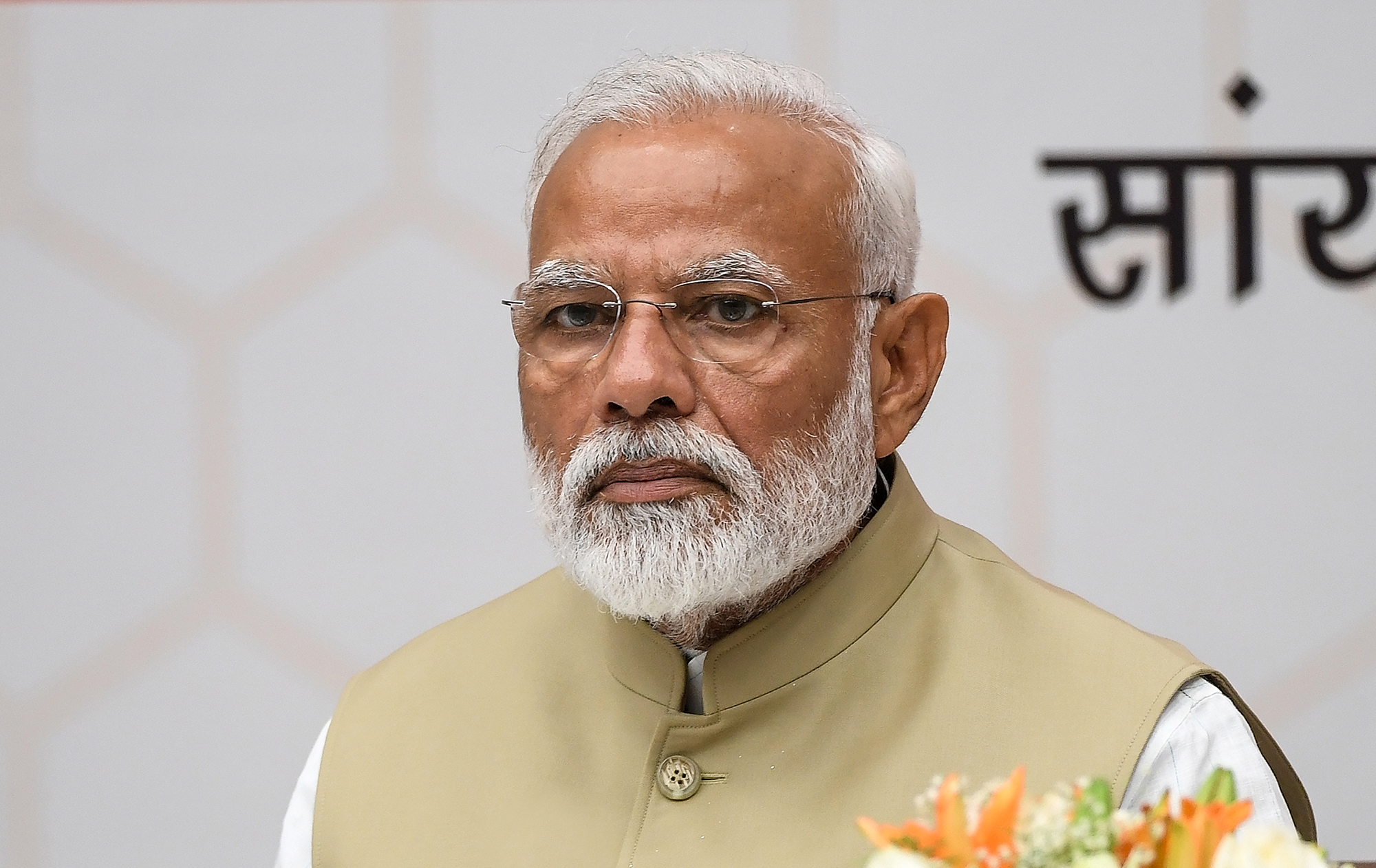 Narendra Modi will retain the post of Prime Minister of India (photo by Getty Images)
Narendra Modi will retain the post of Prime Minister of India (photo by Getty Images)
The chief consultant of the National Institute of Strategic Studies, Alina Hrytsenko, emphasizes that India is the largest democracy (based on the population), and in any case, it is necessary to monitor the country, which is developing dynamically in terms of economy and demographics.
"On the other hand, the election result can be called predictable. Modi and his party are in a very strong position. Over the last ten years, he has consolidated the electorate, although his policies are ambiguous in places. I mean the promotion of nationalist rhetoric, the oppression of the Muslim minority, and so on. This is what the Indian National Congress (the leading opposition force, - ed.) led by Rahul Gandhi is trying to use against Modi. But the opposition is only getting on its feet, so most likely Modi will remain the Prime Minister," she told RBC-Ukraine.
Regarding the Russian-Ukrainian war, India took a neutral position. It abstained from voting for the territorial integrity of our country and purchased large volumes of oil in Russia. Last fall, opposition leader Rahul Gandhi said he agreed with such a policy, and Moscow would remain an important economic partner. Obviously, under any schedule, sympathy for Ukraine will not suddenly appear in New Delhi.
"India has taken the most acceptable position for itself. Strategically more correct than China, which has become quite toxic for the world community, taking into account the confrontation with the USA. And India, on the contrary, manages to sit on several chairs at once. It cooperates with the Americans and the French and implements several projects with Russia, including military-technical projects. Therefore, the Indians will keep a certain distance from Ukraine," Hrytsenko said.
However, India as a partner is interesting for Ukraine, diplomacy has already intensified, and a warming of relations should not be ruled out either. There may be investments in certain areas, in energy and infrastructure restoration.
"Most likely, we will have more intensive cooperation. Especially since the Minister of Foreign Affairs Dmytro Kuleba will soon go to India. There will not be any drastic changes, but it is important to maintain consistency in actions and develop diplomacy. Then we can count on a more favorable attitude towards Ukraine," the expert added.
European Parliament. How June elections may affect support for Ukraine
Elections to the European Parliament will be held on June 6-9. This is important for Ukraine for several reasons. First, the European Parliament is a large representative body, endowed with great powers and determines the policy of the European Union. Especially on expansion, budget, and defense. In many respects, the future of our country in the EU is now being decided, in addition, the union ranks first in terms of support during the war, explains HennadiI Maksak, executive director of the Foreign Policy Council "Ukrainian Prism".
Secondly, the European Parliament elects the leadership of other institutions, votes for their composition, and influences the executive branch of the European Union, which will be rebooted closer to autumn.
"This is a significant process that will determine how the situation in the EU will develop in the next five years," he said.
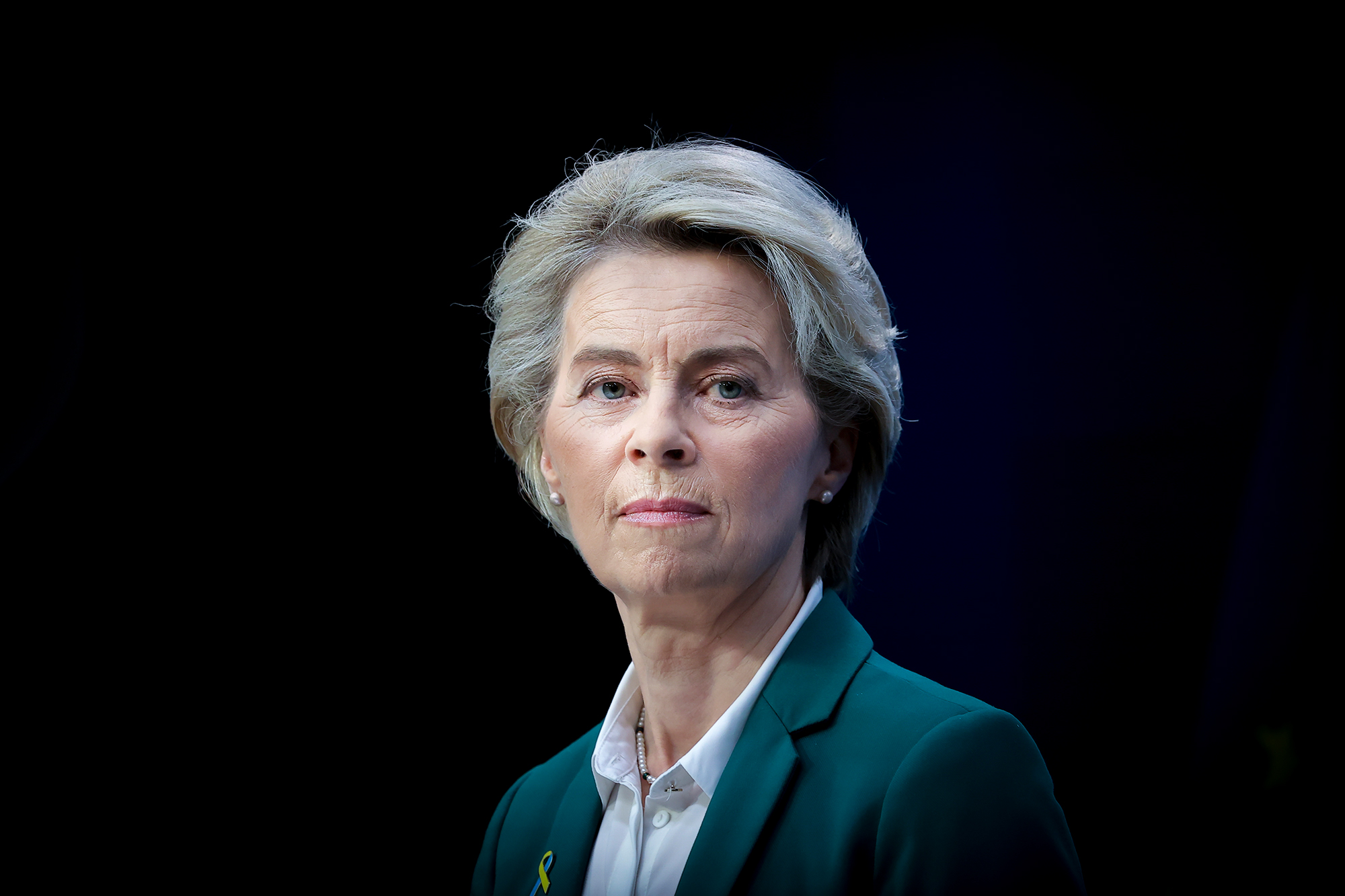 European Commission President Ursula von der Leyen is likely to seek a second term as the center-right European People's Party is set to win the majority of seats in the European Parliament elections (photo by Getty Images)
European Commission President Ursula von der Leyen is likely to seek a second term as the center-right European People's Party is set to win the majority of seats in the European Parliament elections (photo by Getty Images)
In June, all 27 participating countries will elect 720 deputies according to their quotas. Then there will be a reboot of the European Commission.
Polls show that the main political groups - the center-right European People's Party (EPP) and the center-left Progressive Alliance of Socialists and Democrats (S&D) - will continue to dominate the European Parliament. This is unlikely to be hindered by the strengthening of the far-right, which is expected in connection with recent victories in the Netherlands and Slovakia, as well as strengthening positions in Germany and Austria. The far-right bloc Identity and Democracy, in particular, includes the League (Italy), the National Union (France), the Austrian Freedom Party, and the Alternative for Germany. Their leaders have previously repeatedly expressed sympathy for the Kremlin and opposed aid to Ukraine.
According to Maksak, the influence of the right will grow, but we should not be afraid of this, we should prepare and work with mainstream parties so that they maintain support for Ukraine.
"Wartime diplomacy covers many areas. These include sanctions, financial support, weapons, confiscation, and transfer of Russian assets. Some groups in the European Parliament may change, and there may be attempts to form a different coalition, but it is important for us that it remains pro-European. So there were forces that would play against the EU itself and cause dissonance in its policy. I hope that the leaders of European institutions will be pro-Ukrainian. There are high chances that Ursula von der Leyen will lead the European Commission for the second time," he said in a conversation with RBC-Ukraine.
Although in political statements the European Union is steadfast in its support, in reality, it rests on the position of individual states. For example, in February, an aid package worth 50 billion euros was agreed upon, although the launch of the program was planned for the end of 2023, but it was blocked by Hungary. And since May, this country has blocked a 500 million euro tranche from the fund that finances the purchase of weapons for Ukraine.
"If the EPP receives the majority of mandates, then, we will have someone to work with and something to work on. We must understand that there may be nuances at each specific moment, and they must be taken into account. It is possible to strengthen communication with individual member states, and offer solutions. It won't be easy," the expert added.
Germany. Right strengthening can shake already vulnerable Scholz
Bundestag elections are scheduled for autumn 2025, but this year elections will be held in three eastern German states - Saxony, Thuringia, and Brandenburg. Their results will have an impact on the overall political situation, as the current government has the support of about a third of the electorate, and the January Infratest-dimap poll shows Chancellor Olaf Scholz's approval rating at 19%.
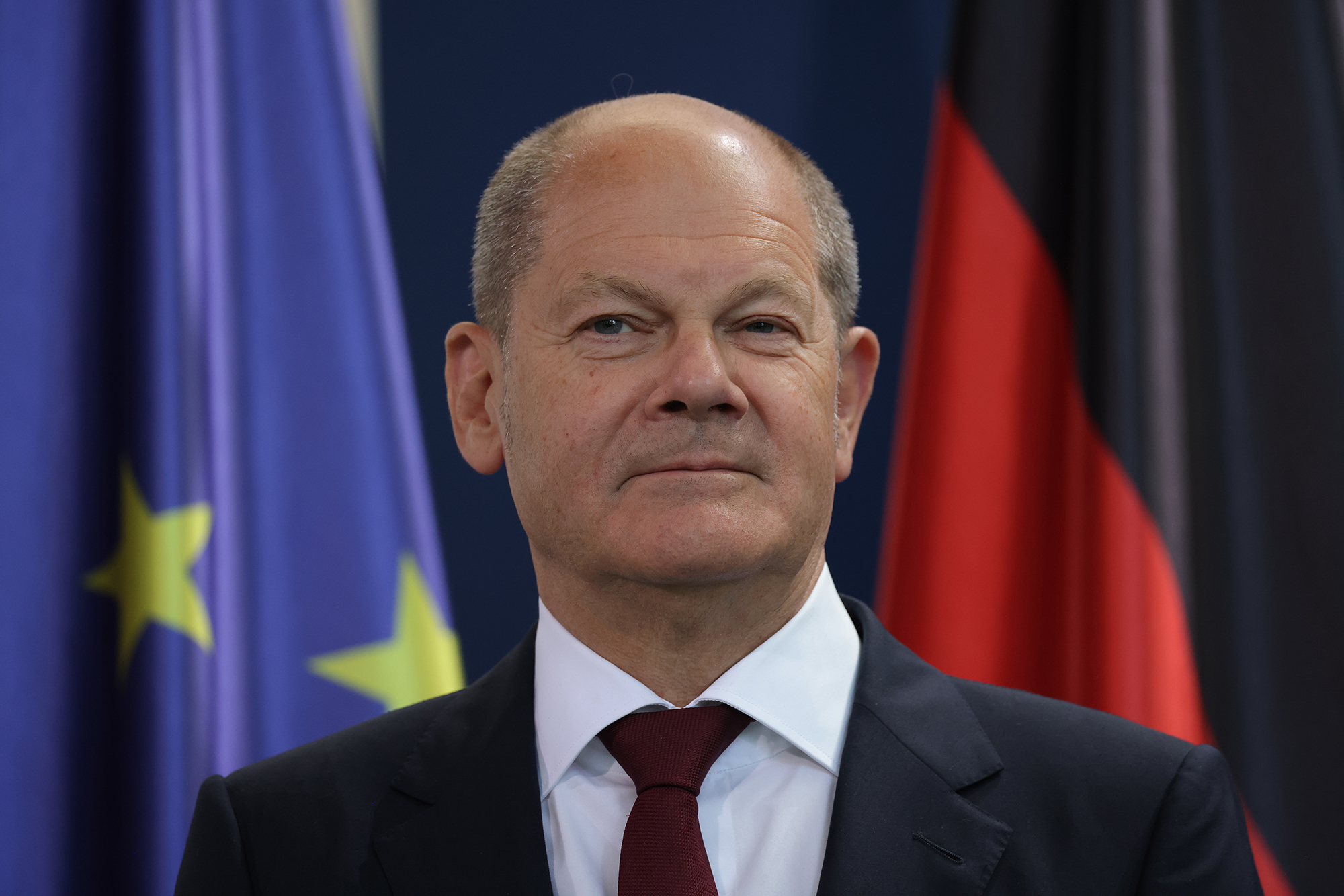 German Chancellor Olaf Scholz could be in danger of resigning if his support continues to fall (Photo Getty Images)
German Chancellor Olaf Scholz could be in danger of resigning if his support continues to fall (Photo Getty Images)
Against the backdrop of inflation, economic contraction, and strikes, the popularity of radicals, especially the far-right Alternative for Germany, is growing. In the eastern lands, it can win by gaining more than 30%, and without it, it will be difficult to form regional governments. German policy remains the focus of Ukrainian attention since during the war Germany became the second largest donor of military aid. Its total contribution is estimated at 17 billion euros, and official Kyiv is interested in uninterrupted supplies.
However, even without strengthening the right, the situation is not stable, says Hennadii Maksak. The so-called traffic light coalition (Social Democrats, Free Democrats, and Greens) is not so strong and does not show signs of healthy life. There are disagreements on many issues, including Ukraine.
"I think that's why Scholz tries to balance without clear messages about what he can offer Ukraine. He tries to take into account public opinion, the opinion of partners, and in the end, he seems like a weak leader who doubts more than takes any steps," he said.
European media previously wrote that the chronic government crisis and Russian shadows could lead to the resignation of the Chancellor. The Italian newspaper La Repubblica, citing sources, reported that Defense Minister Boris Pistorius could replace him. He became the most popular politician in 2023. But about Ukraine, he does not stand out for too decisive support.
"It's useless to suggest something in politics. However, even if Scholz is maneuvering between his partners in this crisis, anything is possible (regarding resignation, ed.). Although I have not seen such deep crises yet," Maksak added.
USA. Main elections of 2024 and challenges for Ukraine
In November, the attention of Ukraine and the whole world will be focused on the USA, where on the 5th there will be elections for the President, a third of the senators, and the House of Representatives. Who will be the owner of the White House for the next four years and what Washington's foreign policy will be depends on their results.
The campaign in the USA will be almost the most important topic of the entire year 2024, as this country remains the guarantor of the Western world order and security. In addition, opponents of democracy, such as China, Russia, Iran, and North Korea, are targeting them - all of them have an interest in how the elections will be held and who will win them, says Oleksandr Krayev, an analyst at the "Ukrainian Prism" center.
 Donald Trump's victory in the US elections will be a challenge for Ukraine (photo by Getty Images)
Donald Trump's victory in the US elections will be a challenge for Ukraine (photo by Getty Images)
In November, the scenario of the last election Biden vs. Trump will be repeated. Incumbent Joe Biden is set to stay in the White House, while Donald Trump has outpaced his Republican rivals and maintains a fairly high approval rating.
Read more about this in the RBC-Ukraine article "Storm brewing: How Donald Trump approaches his second presidential term in US."
The Economist says, according to the average data of polls, 45% of voters are ready to support Biden, Trump - 44%. In general, as of March, the chances of both candidates look roughly equal, Kraiev notes.
"Even in key states, Trump's advantage is still not systematic, it changes from week to week, sometimes Biden is even ahead of his opponent in some key states. We cannot realistically say whose chances are higher yet," he said in a conversation with RBC-Ukraine.
Ukraine will watch the elections very closely. Including because Trump's 24-hour promise to end the war and hints at ending aid are worrying. Although he has recently softened his rhetoric, the Republicans, who are blocking the $60 billion package, have picked up on his idea and are preparing a bill that will partially cover Ukraine's military needs on the terms of a loan. Either way, his eventual victory will be a challenge.
"The main challenge is that for quite a long time, up to six months, maybe more, the United States will be busy trying to digest Trump and his new reforms. And it will not be clear whether Washington will be able to engage in foreign policy during this period, to help Ukraine and other partners. One way or another, Trump will be problematic and a crisis. But I will not say that this is an apocalyptic scenario for us. We can see how his rhetoric can change. However, the point is that for us he is not so predictable as Biden," Kraiev added.
United Kingdom. Conservatives are losing their ratings, but support for Ukraine will not weaken
Parliamentary elections in the UK are likely to be held in December and will lead to a change of government. Because after 14 years of the Conservatives' rule, Labor led by Keir Starmer had a chance to win.
 UK Labor leader Keir Starmer has a high chance of leading the government (photo by Getty Images)
UK Labor leader Keir Starmer has a high chance of leading the government (photo by Getty Images)
A combined BBC poll shows his party's approval rating at 44%. Meanwhile, support for the Conservative Party has fallen to 23%, the lowest since October 2022, when Rishi Sunak succeeded Liz Truss as Prime Minister. As the BBC writes, the positions of the conservatives have weakened not only due to voter fatigue, the increase in the cost of living, and exchange rate swings, but also due to the growing popularity of the right-wing Reform UK. Its approval ratings reached 12%, the highest since she ditched the Brexit Party label.
The UK remains Ukraine's top donor, providing billions of pounds in military and financial aid. And no matter who wins the election, there will be no changes in London politics. In February 2023, Starmer came to Kyiv and promised that the change of government would not affect the level of support. And in December, he repeated that his country will help our country as much as is necessary for victory.

